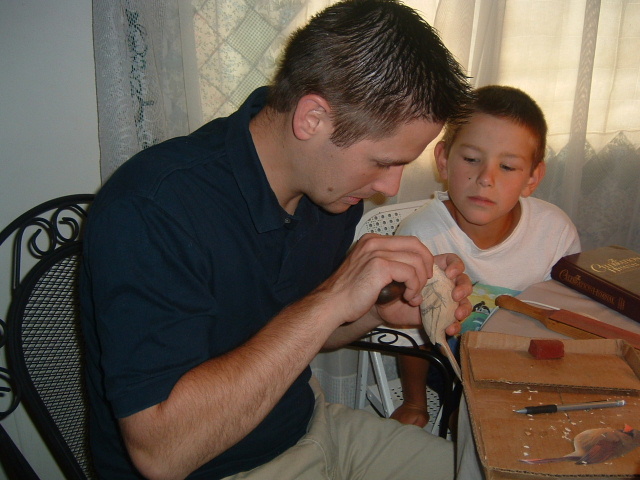|
Quotes
November 27, 2006.
Gerald read this passage on Sunday morning from "The Joyful Christian" by C. S. Lewis (Macmillan Publishing Co., Inc.: New York, N.Y., 1977.) There are people in our lives who irritate us. More difficult to deal with are those that have hurt us deeply. We find that we don't like these people, let alone love them. Yet, God commands us to love each other. How does one do this when one doesn't feel loving towards that person? C. S. Lewis has some practical advice on the topic.
pg. 139-140
Charity
Natural liking or affection for people makes it easier to be "charitable" toward them. It is, therefore, normally a duty to encourage our affections---to "like" people as much as we can (just as it is often our duty to encourage our liking for exercise or wholesome food)---not because this liking is itself the virtue of charity, but because it is a help to it. On the other hand, it is also necessary to keep a very sharp lookout for fear our liking for some one person makes us uncharitable, or even unfair, to someone else. There are even cases where our liking conflicts with our charity toward the person we like. For example, a doting mother may be tempted by natural affection to "spoil" her child; that is, to gratify her own affectionate impulses at the expense of the child's real happiness later on.
But though natural likings should normally be encouraged, it would be quite wrong to think that the way to become charitable is to sit trying to manufacture affectionate feelings. Some people are "cold" by temperament; that may be a misfortune for them, but it is no more a sin than having a bad digestion is a sin; and it does not cut them out from the chance, or excuse them from the duty, of learning charity. The rule for all of us is perfectly simple. Do not waste time bothering whether you "love" your neighbor; act is if you did. As soon as we do this, we find one of the great secrets. When you are behaving as if you loved someone, you will presently come to love him. If you injure someone you dislike, you will find yourself disliking him more. If you do him a good turn, you will find yourself disliking him less. There is, indeed, one exception. If you do him a good turn, not to please God and obey the law of charity, but to show him what a fine forgiving chap you are, and to put him in your debt, and then sit down to wait for his "gratitude," you will probably be disappointed. (People are not fools; they have a very quick eye for anything like showing off, or patronage.) But whenever we do good to another self, just because it is a self, made (like us) by God, and desiring its own happiness as we desire ours, we shall have learned to live it a little more or, at least, to dislike it less.
Consequently, though Christian charity sounds a very cold thing to people whose heads are full of sentimentality, and though it is quite distinct from affections, yet it leads to affection. The difference between a Christian and a worldly man is not that the worldly man has only affections or "likings" and the Christian has only "charity." The worldly man treats certain people kindly because he "likes" them: the Christian, trying to treat everyone kindly, finds himself liking more and more people as he goes on---including people he could not even have imagined himself liking at the beginning.
Matthew's new cat. Photo by Rachel, November 2006.

|
October 28, 2006
This is one of the spiritual goals I have for my life; to be more gentle to all and especially to my loved ones. I read this in my devotions today. This quote is from "Streams in the Desert; Volume 2", Mrs. Charles E. Cowman (Zondervan Publishing House: Grand Rapids, Minnesota, 1966) for October 28.
"We should be gentle above all to those we love the best," J. R. Miller stated in his enlightening little book entitled "A Gentle Heart". "There is an inner circle of affection to which each heart has a right without robbing others. While we are to be gentle unto all men---never ungentle to any---there are those to whom we owe special tenderness. Much is said of the importance of religion in the home. A home without religion is dreary and unblest indeed. But we must make sure that our home religion is true and real, that it is of the spirit and life, and not merely in form. It must be love---love wrought out in thought, in word, in disposition, in act. It must show itself not only in patience, forbearance, and self-control, and in sweetness under provocation, but also in all gentle thoughfulness, and in little tender ways..."
Gerald teaching the boys how to use various tools while putting up our new screen door. Photo by Helen, October 2006.

|
August 12, 2006
Rachel has read most of Louisa May Alcott's books and has just recently begun reading about Louisa's life. This quote is from one of the books Rachel has recently read called "The Girlhood Diary of Louisa May Alcott, 1843-1846: Writings of a Young Author" (Blue Earth Books: Mankato, Minnesota, 2001).
pg. 23
Louisa's Lessons
Mr. Alcott began teaching his daughters at home when they were very young. He had his own ideas about how to teach children. He thought memorizing information was not enough for a person to be educated. He wanted his children to be individuals and to study what was important to them. He wanted them to ask questions and to understand a subject. Mr. Alcott's lessons usually sounded more like conversations than lectures. Mr. Lane and the Alcott girls' other teachers used this same method.
Louisa and her sisters learned about reading, writing, grammar mathematics, drawing, music, and geography. Their father also wanted them to learn about themselves and to be responsible. Louisa wrote in her journal about a conversational lesson with Mr. Lane:
"What virtues do you do wish more of?" asks Mr. L.
I answer:---Patience, Love, Silence, Obedience, Generosity, Perseverance, Industry, Respect, Self-denial.
"What vices less of?"
Idleness, Willfulness, Vanity, Impatience, Impudence, Pride, Selfishness, Activity. Love of Cats.
How can you get what you need? By trying.
How do you try? By resolution and perseverance.
How gain love? By gentleness.
What is gentleness? Kindness, patience, and care for other people's feelings.....
Caleb watches his brother Stephen carve. Photo by Helen, 2006.

|
August 09, 2006
I found another wonderful quote from the book "Thinking Big" by Ben Carson from pg. 249-250.
I think of success as reaching beyond ourselves and helping other people in specific ways. This can be as simple as being a father who inspires his children to make the best of their lives---being a mother who guides her children toward faith in God and confidence in themselves---or being faithful to whatever enterprise one undertakes and doing it with a determination to be the best at that task.
I like the words of Paul in writing to the Colossians. He told wives, husbands, chldren, fathers, and slaves how to live and do their best for each other, summing it up with these words: "And whatever you do, whether in word or deed, do it all in the name of the Lord Jesus, giving thanks to God the Father through him." (3:17).
In our society more women than ever are moving into the work force. Some now look down on those who stay home for their husbands and children. Becaue of the positive influence of my mother, I am doubly pleased that Candy is enjoying her success right now as a wife and as a mother. When our three sons become adults, I hope they will be able to look back at my positive influence and especially the influence of their mother, who spends much more time than I with them.
I know personally the tremendous influence that a mother can exert. Although I am forty, I still remember comments my own mother made to to me. Remarkably consistent, not only did Mother give us the same message any number of times, but she found a variety of ways to express it. And, whether we liked to admit it or not, what she said did make sense.
I wouldn't miss moments like this for all the money in the world! Photo by Matthew, 2006.

|
August 08, 2006
Ben Carson is one of the most celebrated pediatric neurosurgeons in the world. Dr. Carson is most famous for separating the Binder Siamese twins. He is an African-American who came from a poor single parent family. How did he manage to become a neurosurgeon? Two of the things that he credits his success to is that his mother limited his TV watching to two programs a week, and he also had to read two books every week and present them to her in book report form.
Here are a few of his thoughts on reading from "Think Big; Unleashing Your Potential for Excellence" (ZondervanPublishingHouse, Grand Rapids, Michigan, 1992).
pg. 211--214
Although we can learn in many ways, I am convinced that books are the best source for acquiring knowledge. Here are three significant serendipities that reading furnishes us:
1. Reading activates and exercises the mind. 2. Reading forces the mind to discriminate. From the beginning, readers have to recognize letters printed on the page, make them into words, the worlds into sentences, and the sentences into concepts. 3. Reading pushes us to use our imagination and makes us more creatively inclined.
Reading actually does activate the mind in the same way that we activate muscles when we lift weights. The more active our minds are, the more agile they become, which results in a higher level of creativity. As someone wisely pointed out, "The mind, once stretched by an idea, never returns to its original dimensions."
Developmental psychologists now estimate that ninety-eight percent of babies are born with creative ability....
Fifteen years after birth, however, many of those same clever and creative infants, now teenagers, spend much of their time looking at television or videos. They have images and sounds already packaged and ready for them at the flip of the button. This lifestyle requires them to use little imagination. Why should they? Everything is done for them, including telling them how to dress, think and behave. Consequently, they do not get into the habit of thinking for themselves. All they have to do is follow. Even when we talk about the so-called intellectual progams on television, we might ask, Are they truly stimulating the intellect? I have serious reservations.
We can watch a presidential press conference without even having to think about its message or trying to analyze it. Immediately afterward, a network news anchor digests it for us, giving us a blow-by-blow analysis. Usually the first one then pauses so that a second commentator can analyze it some more.
We have gotten away from analyzing matters for ourselves, from thinking ideas through, from creatively using our minds and imaginations. Ultimately, it is costing us. If we scrutinize just the decline of science in this country, we can see that our indifference to creatively using our intellects is going to cost a great deal more in the long run....
We put too little money into true education, preferring to spend larger and larger amounts on football and basketball. Favorite nonfiction TV fare centers around programs such as Lifestyles of the Rich and Famous and American's Funniest Home Videos, rather than on Nova, or Jeopardy or Nature. We find virtually nothing from those who want to make our environment comfortable, provide us with fantastic inventions, add to our knowledge, and encourage research so that we can lead longer and healthier lives.
I am not opposed to popular entertainment. I do, however, at least urge balance. I would like to see authority figures and highly achieving individuals proclaim, "Read! Read! Read!"
Because I feel strongly about this, I want to go record with a strong statement: Ife we would spend on education half the amount of money that we currently lavish on sports and entertainment, we could provide complete and free education for every student in this country....
In traveling across the United States and talking with leaders and achievers, I have observed simple fact about the influence of books. I want to pass this on because of its simplicity and the implications for a generation of American children: Students who excel academically, read extensively. I suspect that there is virtually a one-to-one correlation between avid reading and intellectual accomplishments.
Matthew reading while he plays with his cockateils. Photo by 'Beka, 2006.

|
July 02, 2006
This sweet little poem reminded me of what our priorities should be as a mom and WHY we stay at home. It is from The Family Album, edited by Arthur and Nancy DeMoss. (Valley Forge, Pennsylvania, 1974.)
pg. 45
An Adored Mother
She mended a doll
and the washing waited.
The dust lay thick
while a fish hook was baited.
When Injuns attacked
her dinner burned up.
She provided a bed
for a straying pup.
A two-year-old helped
with the cookie dough,
The ironing dried out
while she romped in the snow.
Her neighbors whispered
to one another,
But the children laughed
and adored their mother.
by Carolyn Beaucamp
Caleb and Timmy making Christmas cookies. Photo by 'Beka, 2005.

|
June 30, 2006
We received the June 2006 Imprimis (Volume 35, Number 6) a few days ago and I read it to Gerald last night. When I saw the title of the article, "A New Feminism" I got excited. This is going to be good, I thought. I was not disappointed. "I simply have to post this to my website, in its entirety," I said to Gerald. While I don't agree with every point Harvey C. Mansfield makes, I agree with much of it. It is a well written, intellectual response to feminism. Reprinted by permission from IMPRIMIS, the national speech digest of Hillsdale College, www.hillsdale.edu.
The New Feminism
Having recently written a book on manliness, I have been asked whether I have anything to say on femininity or womanliness. I do, but it takes the form of suggestions. I don't want to speak for women, as I think that each sex needs to speak for itself. It is quite natural for each sex to take its own side, and women will never simply accept a man's view-particularly not today, when they have acquired the habit of speaking for themselves. But I think they will listen, careful judges that they are, to suggestions from a friend.
How could a man be a friend to women? I notice that men who speak on behalf of the feminism of today-which I hope will become the old feminism-are tolerated even though they presume to put words in women's mouths. These men are manly defenders of the women who they say do not need to be defended by men. Though they act in manly fashion to protect women, they foreswear the manliness that inclines them to perform this duty. With their deeds, they contradict their words.
For too long, manliness has been silent in its own defense; for too long, it has been silenced by the voice of feminism. Yet feminism in the phase that began in 1963 with Betty Friedan's book, The Feminine Mystique, was directed against femininity, not manliness. Femininity was the feminine mystique that had been imposed on women by men in order to subordinate women, even enslave them. According to Betty Friedan, the ideal of femininity set women on a pedestal where they would be admired and adored by men. In this pose women were not masters or mistresses but servants who did little they wanted to do for themselves. Disabled and passive, they lived for their families and their husbands. Apparently admired by men, they were in fact controlled by men.
The feminists of the Sixties and Seventies were hostile to manliness more for its name, which seems to exclude women, than for its qualities. They attacked the male chauvinist pigs who wanted to keep manliness for themselves; these men were sexists-a new label then-for believing that only males can be men. Simone de Beauvoir's The Second Sex (1949), an earlier and more fundamental book than Friedan's, had argued that women were not different from men by nature, but only by history. It was a history of oppression by men that kept women from being as aggressive and assertive as men are. With the title of her book, Beauvoir implies that men live a better life than women, that manliness is better than femininity. Since women are perfectly capable of manliness, that quality should no longer be named for one sex. Beauvoir renamed it “transcendence,” a gender-neutral term. The gender-neutral society was born and manliness as the quality of a sex was demoted to masculinity, a title that signifies such homely features as the hair on your chest and your face.
Femininity Destroyed
Thus feminism, in its eagerness to claim manliness for women, destroyed femininity. We began to see gangster movies with lovely actresses playing the role of hit men. Some feminists denounced the manly passion for competition and war, but in doing so they had to be careful not to imply that women are unsuited for business or for the military. Since the Sixties, we have become used to seeing women in men's occupations. Yet the gender-neutral society created by today's feminism is not in fact as neutral as it claims. Despite its dislike of the word manliness, it is on the whole friendly to the quality, now under a new name, more neutral and prosaic, such as “leadership.” On the one hand, the world seems to have been feminized, yet on the other hand, it is still a man's world, and in a strange way even more so, because both sexes are now engaged in employments that reward the manly qualities of aggression and assertiveness.
In sum, women have shown themselves capable in careers formerly closed to them, but seem no longer to enjoy the pleasures of being a woman. They know how to imitate men but are confused about how to remain women while doing so. Having started from the rejection of femininity, women's identity necessarily becomes a search without a guide. To see confusion in action, all you have to do is watch the television show Desperate Housewives.
On that show you see that women have not really been liberated by the gender-neutral society. Men and women are not the same, as the gender-neutral society of feminism claims. Nor are men and women merely different. They are both same and different. Formerly society recognized the differences between the sexes, and with laws and customs accentuated those differences. Now society does the opposite: it recognizes the similarities and accentuates them. There is no society without social pressure in one direction or another. Whereas before women were held back from the careers they could have attained, now they are pushed further than they may want to go. In this new situation women do need an identity; they need a feminism to replace the tradition we once lived by. But they need a new feminism, one that does justice to the differences as well as the similarities between the sexes.
Finding a New Feminism
My first suggestion is to abandon Simone de Beauvoir's The Second Sex as the authority for women. Beauvoir taught women to seek independence or autonomy. These are fine-sounding words, but in practice they mean independence of one's husband and children. A few women may put such independence to good use, but for most it makes no sense to be deprived of a loving husband and to avoid or despise motherhood. Beauvoir's radical prescription of autonomy makes women uneasy; it is responsible for the fact that today so many women reject the label of feminist despite the benefits they believe they owe to feminism. Beauvoir thought that women could become equal to men only by becoming autonomous, as she believed men to be. She was moved, therefore, to deny that there was any natural or essential difference between men and women. And to be certain of this point, her followers insisted that there were no essential differences of any kind; to believe that essential differences do exist is a sin called essentialism. But the feminist rejection of essences too should be abandoned as contrary to common sense and productive of mischief. You can say that men and women are not different, but if you try to live your life by that belief you will make many unnecessary mistakes. To be for autonomy and against essentialism is over-dramatic theory unworthy of women's plain good sense. Nor is it beyond the capacity of philosophical women to say why it is wrong in theory.
A second suggestion following the acceptance of sex differences is to respect the manliness of men. Manliness is the character of men that makes them insist on being men, on distinguishing themselves from women and also from unmanly men. Manly men reproach unmanly men, but merely look down on women, who are excused from manliness. After all, they are women. To accept differences between the sexes is to tolerate this apparently irrational prejudice of men. “A man needs to feel he is important.” I came across this statement in a professor's book made by an uneducated woman about her husband; in her embarrassment for him, she generalized the fault to all men. But it is true of most men and it may not be a fault. Human beings need to feel important so that they believe that what they do for good or ill matters in the grand scheme of things. Manly men who stand up for a country, a cause, or a principle help all of us to feel important. Women want to feel important as well, but usually in a different way; they want to be important to someone-to their children, to their man. Men, poor dears, have a more abstract sense of importance than women that is also more egoistic. Women may be vain, but men are conceited.
Women have an intuition of this difference, but today's feminism does not allow them to think about it. A new feminism would encourage women to consider how they differ from men and what this means for their lives. One thing it does not mean is that women should give up their careers and simply return to the kitchen. Women's careers are here to stay. No doubt many women would be relieved to learn that they are not required, out of duty to their sex, to take a man's job and work a man's hours for a man's pay. But careers should be open to women on an equal basis to men. The career part of the gender-neutral society has worked pretty well and to the satisfaction of both sexes. It would work better if there were less pressure on women to prove they are equal to men by imitating men. Women do not have to have the same careers, or careers to the same degree, as men.
To accept this idea does not make women The Second Sex, subordinate to men. For the importance that manliness claims, and the self-importance that manly men easily adopt, does not receive or deserve automatic respect from women. Women can judge; they are great critics of others and of themselves. Manly men may initiate great enterprises in politics, smaller ones in business, and in courting be the first to make a pass-someone has to make the first move if the human race is to continue-but women are the best judges of men, particularly in private. Women judge and criticize their men, the ones they love. A judge does not initiate the case, but by judging the judge is elevated above the parties to the case. So coming second can be the superior role.
The Double Standard Reconsidered
Next, a new feminism might want to abandon the obsession with sex that is such a dubious feature of present-day feminism, whether radical or moderate. The women's movement hit the American scene just after the sexual revolution of the Sixties. As part of that revolution, women were for sure treated disrespectfully, enlisted, for example, as camp followers of the rock groups of that era. Yet for reasons of its own, feminism made an alliance with sexual liberation. Beauvoir and her radical followers believed that autonomy for women required them to be just as promiscuous as men, indeed as the most predatory men.
The traditional double standard of sexual morality had been higher for women than for men, but feminists posited that men could get away with anything. Rather than trying to elevate the standard for men's sexual behavior up to that of women, as nineteenth-century and early twentieth-century feminists proposed, the Beauvoir feminists proposed to lower the standard for women down to that of men. The result of abolishing the double standard has been to do away with any standard. Moderate feminists such as Naomi Wolfe have begun to have second thoughts about this result.
We know, of course, that the practice is not as bad as the theory, for most American women are more modest, and most men less bold, than they have a right to be according to the feminists. A new feminism might want to take account of this fact. It could point out that promiscuity is a man's game that women cannot by nature play on equal terms. Women have three disadvantages: they get pregnant, they contract sexually-transmitted disease more easily and more seriously, and most important, they suffer more from heartache than do men. Men, with their abstractness, their obliviousness, their disregard, are furnished with the mental equipment for an exit strategy from sexual encounters, as women are not. The double standard accommodates this inequality between the sexes and deserves to be reconsidered.
More positively, it may be time to recover women's modesty as a virtue. Why do both sexes have to be ambitious for conquest? The moral authority of women is a heavy counterweight to the physical superiority of men. With that authority, women have a right to say no to any proposal or proposition from a (generally stronger) man that does not suit them, and be obeyed. But men's willingness to obey depends on women's being held to a higher standard of morality, especially sexual morality, than men. If a woman cannot say, “How dare you!” to a man, her defenses are sapped because without a moral objection she has only her whim to rely on. In response, a man will think and will say, “Why not? We are equal and so my desire is equal to yours.” The feminists in their desire for unattainable equality threw away this advantage for women even as they made use of it. For the means they used to gain equality-raising consciousness-was designed to shame men, not convince them. It was an exercise of women's moral authority more effective than argument.
The present-day feminist notion of autonomy takes no account of women's domesticity. If women were autonomous, they would not want to live in a home. Let us not be too romantic about a home-much housekeeping is drudgery-but let us not sum it up as a necessary evil, either. To a woman, home is where your husband lives and where your children learn. In the best and also in the normal case, it is suffused with love. For the great majority of human beings, happiness is found in a happy home. To be the manager of a home is the moderate and attainable ambition of most women; it is the place where they find honor and joy. It is where they most readily find “recognition,” if we must use that word. The husband must make a contribution to the home, and there are tasks which by nature and convention are his; to these we may add, from them we may subtract, in particular cases after negotiation by the parties. The result is that each home will be its own. Yet the woman should want to be in charge and take responsibility for the home, for to give her husband an equal responsibility would be to lose her sovereignty over the whole. Does a prudent woman want to let her husband decide when the house is clean?
A Return to Happiness
The problem for a new feminism is how to combine home and career. This is obvious, but present-day feminism in its zeal to leave femininity behind does not address what is obvious about women. Its only idea is government-funded day care. Day care of some kind we need, to be sure, but the premise of government-funded day care is that work comes first. What if work and family are both first? This is what women mean, I think, when they say that they “want it all.” The difficulty in combining work and family is not merely that they compete for a woman's time, though of course they do. It is that they require completely different attitudes. To be successful at work, a woman must have something of a man's ability to concentrate and to set aside distractions. To be a good mother, however, a woman must always be open to distraction and actually welcome the interruptions of a child who, in the first years at least, always thinks he is entitled to 100\% of her time. How can these opposed attitudes be made into a rhythm of life, relieving rather than infringing on each other?
To return to happiness, women need to take their equality for granted and dismiss it from their present concerns. Perhaps that is how most women live today, but they are constantly prompted by the feminism of our time to yearn for an impossible, utopian equality between the sexes in which no differences are tolerated. We need to go back toward the sex roles of the past but not all the way. What we need are expectations-as I would call them-for women and for men, social conventions that give guidance in general but permit exceptions and encourage negotiation for different circumstances. Especially in private life we need to make it honorable again that a woman be a woman, and a man a man. Let the state be gender-neutral, but society needs the responsibility that comes from knowing what is expected of your sex.
My last suggestion for a new feminism is that it need not be so political as the feminism we have, the feminism whose slogan is that the personal is the political. It would be better if the personal were not political, if women of our day were not required to advance the cause of woman. The “battle of the sexes” will never die, for men and women have different outlooks and will never quite see eye-to-eye. The old feminism tries to overcome that basic truth by compelling us to live under the aegis of gender neutrality. It sounds like liberation but it isn't. A new feminism would accept the difference and make the best of it. A new feminism would have its problems too, but I believe it would come as a relief.
My lovely daughter, Rebekah. Photo by Rachel 2005.

|
June 30, 2006
This quote comes from a very special person in my life, my oldest daughter, Jennifer. She sent me the following in an e-mail this week.
Hi Mom,
Here is something that I just came across in my devotions in Nehemiah 9:23.
"Their children also multipliedst thou as the stars of heaven..."
This was stated by the leaders of the children of Israel as they were reviewing some of their history in a prayer to the only true God. Doesn't God have a nice word picture here? "As the stars of heaven..." Twinkling stars are beautiful points of light in a dark sky and they bring glory to their Maker!
Also notice WHO is credited with doing the multiplying---God Himself.
It encouraged me when I read it.
Love,
Jennifer
'Beka, Jennifer and Rachel singing together. Photo by Helen, Christmas 2005.

|
June 27, 2006
Gerald's sister, Marg, gave us a gift subscription to "Discipleship Journal" for Christmas last year. I particularly enjoyed the July/August 2006 issue. Well, maybe not "enjoyed," "was challenged by" would be more accurate. One article called "Alternatives to Affluenza: Living Light in the Land of Plenty" by Christie and Paul Borthwick caused me to ponder.
pg. 45
Valuing Stewardship
A foundational value we discovered in Scripture is stewardship. Big word, but it essentially means that all we have is God's already, and He assigns us to be caretakers of His wealth. When we look at our money and possessions, we see them as God-given resources that we are managing in this life and for which we will give an account in the next.
One way our identity as stewards has impacted our lifestyle is to challenge our tendency to procrastinate. At times we've been tempted to say, "Let's get more settled financially" or "Let's buy such-and-such first" before putting into practice some countercultural decision we'd agreed upon. Yet good stewards recognize that the impact of decisions will accumulate--either toward generosity or toward selfishness. C. S. Lewis summarizes that process beautifully:
"Good and evil both increase at compound interest. That is why the little decisions you and I make every day are of such infinite importance. The smallest good act today is the capture of a strategic point from which, a few months later, you may go on to victories you never dreamed of."
Valuing our calling as stewards of God's wealth has helped us persist in---and not procrastinate from---those small daily decisions that eventually form a lifestyle. It has kept us faithful in the small things. (Lk. 16:10).
This is what 10 hands looked like after picking mulberries from the roadsides! Photo by Helen, June 2006.

|
June 26, 2006
As the children were swimming and fishing in a country stream yesterday (Sunday), Gerald read the following to me from the May 2006 Imprimis (Volume 35, Number 5) newsletter. The article is called "A Man Worth Knowing" by David McCullough. It is about John Adams who was vice president under Washington and later president in 1797. McCullough mentions John Adam's wife, Abigail, and all that she did for her husband, John. I find her life inspiring because even though according to our present culture she was "just a wife", she did so much for our country by being an enthusiastic helper to her husband! This quote is reprinted by permission from Imprimis, the national speech digest of Hillsdale College, www.hillsdale.edu.
pg. 2
Let me say a word about Abigail Adams. She probably had better political sense than her husband, and was a better judge of people. And she loved politics. There is a wonderful scene in the White House after Adams had been defeated for re-election by Jefferson. Jefferson was invited to come over and have dinner, as were many members of the Senate and the House. He sat at the table beside Abigail, asking "Who's that man over there?" and "Who's this one over here?" And she told him everything about them---where they came from, what their constituency was, what their interests were. She was as bright as can be and had a backbone of iron. She probably didn't weight 100 pounds, standing only about five feet one. I think she's one of the greatest Americans of all time. And you can discover her too, in her marvelous correspondence with her husband during his long absences.
Something I always like to emphasize is that there never was a simpler past. We hear often, "Oh, that was a simpler time," but it's always wrong. Imagine Abigail's life. Up in the morning at about 5 to light the fireplace that served as the kitchen, call to the children to come down, cook the breakfast, tend the stock, try to keep the farm solvent during the whole war with her husband gone and with inflation and with shortages of eveything. Schools were closed, so she had to educate the children at home. Her day didn't end until 9 or 10 at night when the children would go upstairs to their bedrooms, where it could be so cold that the water in the bowls that they used to wash their faces was iced over. And then she would sit down at the kitchen table with a single candle and write some of the greatest letters ever written by an American.
In one plaintive letter, she writes: "Posterity who are to reap the blessings will scarcely be able to conceive the hardships and sufferings of their ancestors." And we don't. We don't know what they went through---epidmics of smallpox or dysentery, which could take the lives of hundreds of people just in the little town of Quincy, Massachusetts. It was by no means a simpler time. They had to worry about things that we don't even think about any more, and suffer discomforts and inconveniences of a kind that we never even imagine. We have little idea of how tough they were. Imagine John Adams setting off in the middle of winter to ride nearly 400 miles on horseback to get to Congress. Try riding even 40 miles sometime. John and Abigail were separated, in all, more than ten years because of his service to the country.
Beka and Rachel making clam chowder from clams they dug at the stream. Photo by Helen, June 2006.

|
June 22, 2006
Several years ago a subscriber sent me a lovely book called "Golden Thoughts of Mother, Home and Heaven" (Bridge-Logos, Gainsville, Florida, 2003). It is filled with beautiful old pictures as well as wonderful quotes from old books. Here are two quotes.
pg. 260
Patience with Children (by Charles Haddon Spurgeon)
In planting beans the old practice was to put three in each hill: one for the worm, one for the crow, and one to live and produce the crop. In teaching children, we must give line upon line, and precept upon precept, repeating the truth which we would inculcate, till it becomes impossible for the child to forget it. We may well give the lesson once, expecting the child's frail memory to lose it, twice, reckoning that the devil, like an ill bird will steal it, thrice, hoping that it will take root downward, and bring forth fruit upward to the glory of God.
pg. 33
The Mother's Opportunity
Mothers, you are the divinely-appointed teachers and guides of your children, and any attempt to free yourselves from your duty is in direct opposition to the will of God. If you neglect them, the consequences are swift and sure, and how fearful they are. Let those broken-hearted mothers tell who have bowed in anguish over their lost sons; who, neglecting them in childhood, have at last seen them dead to every manly virtue.
Let me say to you who still have the opportunity to do so, train your children, whether boys or girls, to usefulness. Give them something to do. And as soon as they can walk, teach them to bring any little thing to you. And as they grow older, let them do all they can to help you. And as they grow older, let them do all they can to help you. Spend most of your time with your young children. Sleep near them. Attend to washing and dressing them. Let them eat at the table with father and mother. Read, talk, play, walk with them, and be their companion and guide in all things and at all times. When the father can leave his work to take a little recreation, let him take it with the children, making it a special holiday. Don't be in haste to sent them to school, but teach them at home. Oral instruction can be given while you are doing your work, and for a while will be of much more benefit than many hours of study. As soon as they want playmates, see that they have those of their own age, who have been well cared for at home, and are truthful. Let them play in or near the house, that you may observe the character of their [speech.]
Timothy (9) and Caleb (7) on an "adventure!" in our pool. Photo by Rebekah, June 2006.

|
June 13, 2006
Gerald read the following to me the other night, from "Reader's Digest ABC's of the Human Mind; A Family Answer Book"(The Reader's Digest Association, Inc., New York, 1990):
pg. 182 and 183
"Can you raise a child to be an innovative thinker?
Childhood is perhaps the most creative period in anybody's life. Pre-schoolers make dolls talk, play cops and robbers, build with blocks, draw, dance, pilot a spaceship under a table. The let's-pretend games are pure creativity.
At school, a child must learn the correct solutions, the approved methods: "Don't color outside the lines. No plaid elephants." Every question has a right or a wrong answer. Albert Einstein thought it was a miracle that the modern methods of instruction have not yet entirely strangled the holy curiosity of inquiry; for this delicate little plant, aside from stimulation, stands mostly in need of freedom; without this it goes to wrack and ruin without fail."
Part of a child's natural creativity is the ability to fantasize, to think beyond the right answer, to wonder why and why not. One way to cultivate this trait, experts suggest, is for parents to strike a balance between challenging a child, exposing him or her to new ideas and activities, and letting the child alone to experiment with toys and games. Reading should be encouraged. The more information that is stored up, the more the child can draw on for creative efforts."
My "Seven Sister's Rose." Photo by Rebekah (age 13), June 2006.

|
June 07, 2006
Gerald has been reading "My Life" by Golda Meir (G. P. Putnam's Sons, New York, 1975) and has read to me different sections that he knew would be of interest to me.
One must sacrifice some things for others in order to be a success. If you want to be a success in the work place you must sacrifice your husband and family. If you want to be a success in the home, you must sacrifice a career. As much as our culture says "you can have it all" in reality you cannot. Golda Meir, who became Prime Minister of Israel, realized the conflict between home and the work place very well. At one point in her life, she was asked to be the secretary of the Women's Labor Council of the Histadrut. Here are her words shared from her heart.
pg. 112
"...hardest and most serious of all, I had to face up to the fact that going back to work would spell the end to my attempts to devote myself entirely to the family."
Regarding being a single mother to her children she wrote:
pg. 115
"I was always rushing from one place to another---to work, home to a meeting, to take Menachem to a music lesson, to keep a doctor's appointment with Sarah, to shop, to cook, to work and back home again. And still to this day I am not sure that I didn't harm the children or neglect them, despite the effort I made not to be away from them even an hour more than was strictly necessary. They grew up to be healthy, productive, talented and good people, and they both are wonderful parents to their own children and wonderful companions to me. But when they were growing up, I knew that they deeply resented my activities outside our home.
...were Sheyna [Golda's sister] and my mother right when they charged me for years with depriving the children of their due? I suppose that I shall never be able to answer this question to my own satisfaction and that I will never stop asking it. Were they proud of me, then or later? I like to think so, of course, but I am not really sure that being proud of one's mother makes up for her frequent absences. I remember that once when I was the chairwoman of a public meeting and asked, "all those in favor" of whatever the issue was to raise their hands, to my utter astonishment I saw Sarah and Menachem (who had stolen into the hall to fetch me) loyally raise their hands to indicate their approval. It was the most reassuring vote of confidence I ever got, but it didn't keep me from feeling that being able to vote for your mother is not nearly as good or as important as having her at home when you get back from school.
And of course, later on I was abroad often. When I traveled, my guilt was overwhelming. I wrote to them all the time, even made records for them, which seemed more intimate and I never came back without presents; but I was also never free of the feeling that I was injuring them in some way."
My "Day Lilies and placque." Photo by Helen, June 2006.

|
June 06, 2006
Over the last several months I have been reading the book "The Man in the Mirror: Solving the 24 Problems Men Face" by Patrick M. Morley. (Wolgemuth and Hyatt Publishers, Brentwood, Tennessee, 1989.) Why am I reading a book written for men? Many years ago Elizabeth Elliot recommended this book and I have been keeping my eye out for it in the thrift stores. I finally got a nice, new hardcover. Being the verocious reader that I am, I peered into the book. I was hooked. Many of the principles apply to women as well as men. Here are a few quotes.
pg. 12 and 13
"No greater influence impacts our thinking than the media. Unfortunately, our media in America is controlled by secular humanists, so the slant of most print copy, programming, advertising, and news portrays a secular life view....Through the media and advertising, which relies heavily on subliminal suggestions, we are consciously and unconsciously lured to go for the Madison Avenue lifestyle. The secret of fanning our smoldering desires and wants has been elevated to a scientific approach. The economic goal of television is, after all, to sell products and services! Our problem may be more what our unconscious minds are exposed to than our conscious minds. According to Wilson Bryan Key in his book Subliminal Seduction: "The conscious mind discriminates, decides, evaluates, resists or accepts. The unconscious, apparently, merely stores units of information, much of which influences attitudes or behavior at the conscious level in ways about which science knows virtually nothing. The vast communication industry realized long ago the resistance to advertising which develops at the conscious level. However, there is little if any resistance encountered at the unconscious level, to which marketing appeals are now directed."
You see, we can at least somewhat defend ourselves at the conscious level, but most of consumerism's appeals are directed to our unconscious mind.
Perhaps the only way to overcome this dilemma is to re-evaluate our sources of entertainment and information. Personally, I have virtually stopped watching television and I am trying to read more books. First Corinthians 6:12 offers us a credo worth adopting: "Everything is permissible for me"---but not everything is beneficial. "Everything is permissible for me"---but I will not be mastered by anything.
My concern for myself is that my unconscious mind would be mastered in an area in which I have no ability to resist. Our unconscious mind has no walls around it and no sentinel at the gate.
Watch TV commercials one evening and ask yourself, "If these commercials are true, then who am I, and what am I?" The life portrayed on the tube loves pleasure, sensuality, doesn't deny itself anything, and has a right to whatever goal it sets. I believe you will come to the same conclusion I did."
Poppy in my front perennial bed after a rain. Photo by Rebekah, June 2006.

|
|
|